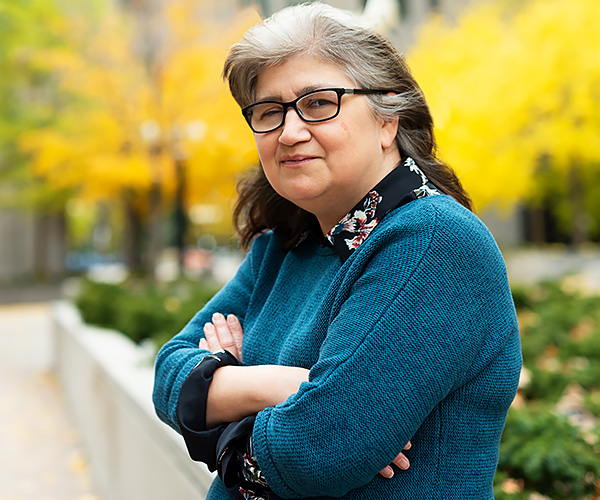Mary B: Storytelling to help others with chronic kidney disease

Vice-Chair of the Ontario Renal Network’s
Patient and Family Advisory Council
On what should have been an average morning in 2013, Mary B. woke up to discover that her hands wouldn’t do what she told them to. She couldn’t button her shirt or dial her phone. Unknown to her, her kidneys were shutting down.
When she came out of a coma in the hospital four days later, she was shocked to learn that she had end-stage kidney disease. Mary was only 45 years old at the time, and she hadn’t experienced any symptoms except some fatigue. This she had attributed to a series of life changes, including a separation, a move and a new job.
Although she initially felt great after starting hemodialysis, the rigours of in-facility dialysis soon took a toll and she had to quit work. “My full-time job became taking care of my kidneys,” she says.
Determined to take an active role in her care, Mary learned all that she could about her condition and treatment. When she discovered she would likely have to wait up to eight years for a kidney transplant, she took to social media to search for a living donor.
Within five months, a cousin volunteered to give her a kidney. But finding a donor was only the first step of what became a complex 18-month process. Mary lives in North Bay, while her cousin lives in Thompson, Manitoba. Tests and procedures had to be coordinated between hospitals in their home towns and bigger facilities in Toronto and Winnipeg.
Healthcare coverage was also complicated. Since Mary and her cousin are First Nations, some services were covered by the federal government’s Indigenous Affairs department, others by provincial ministries of health in Ontario and Manitoba. Fortunately, another cousin stepped forward to help navigate the logistics. “My transplant became a family project,” she says.
On March 24, 2015, Mary received a kidney from her cousin. As she recovered, she began volunteering as a patient advisor with the Ontario Renal Network.
“I realized kidney disease was bigger than just me. I became very interested in changing the system.”
In particular, she would like to see improvements in kidney care services for Indigenous people. “Building relationships between First Nations, Inuit and Métis communities and the Ontario Renal Network is really important. It takes a long time and a lot of work to develop trust and create a base for cultural safety,” she says.
Four years after her transplant, Mary is enjoying a return to working in customer service. In her spare time, she is re-discovering her love of outdoor activities and travel. She is also focused on exploring her Anishnaabe heritage, especially ceremonies and traditional medicines.
“Storytelling is a big part of our culture,” she says. In sharing her story, Mary hopes to support others through their kidney care journey.
Mary B was a patient and family advisor who participated in consultations for the Ontario Renal Plan 2019 – 2023. The plan addresses many of the issues Mary describes, including the need for improvements in kidney care services for Indigenous people. The plan is a road map for how the Ontario Renal Network, the Ministry of Health, health system partners and, in time, Ontario Health will work together to create a kidney care system that delivers person-centred, safe and effective services in an efficient, equitable and timely manner.
Questions about this blog post? Email us at publicaffairs@cancercare.on.ca
